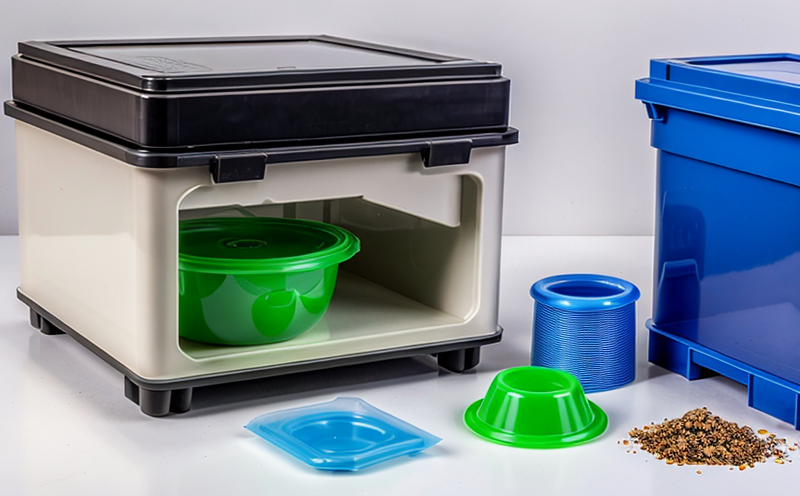Packaging Plastics Testing
The testing of packaging plastics is a critical aspect within the broader sector of polymer and plastics testing. Packaging materials must meet stringent requirements to ensure they are safe, functional, and environmentally responsible. This includes ensuring that the plastic films, containers, and closures used in packaging do not leach harmful substances into food or beverages during storage and transport.
Understanding the properties of packaging plastics is essential for quality managers, compliance officers, R&D engineers, and procurement professionals who need to ensure product safety, regulatory compliance, and performance. By conducting thorough tests on packaging materials, manufacturers can guarantee that their products meet industry standards and consumer expectations.
The testing process involves a variety of methodologies tailored to the specific needs of each type of plastic used in packaging. For instance, thermal stability is crucial for ensuring that plastics do not degrade at high temperatures or during prolonged exposure to sunlight. Another key test is impact resistance, which helps determine how well the material can withstand physical stresses without breaking.
Additionally, testing focuses on barrier properties such as oxygen and water vapor permeability. These tests are vital for preventing contamination of products within the packaging and extending shelf life. Furthermore, flame retardancy is a critical concern to ensure that packaging materials do not catch fire easily or release toxic fumes when exposed to flames.
- Eco-friendly alternatives: Testing for biodegradability and compostability of packaging plastics helps in promoting sustainable practices. This ensures that waste from these products can decompose harmlessly in natural environments.
- Recyclability: Evaluating the recyclability of plastic packaging is essential for reducing waste and conserving resources by enabling the reuse of materials.
In conclusion, packaging plastics testing plays a pivotal role in maintaining product safety, ensuring compliance with regulatory standards, and promoting sustainability. By leveraging advanced analytical techniques and following established protocols, laboratories can provide accurate and reliable results that support informed decision-making throughout the supply chain.
Why It Matters
The importance of packaging plastics testing cannot be overstated in today’s globalized market. Properly designed and tested packaging not only protects products but also enhances consumer trust, minimizes waste, and supports eco-friendly practices. For quality managers and compliance officers, ensuring that packaging meets all necessary standards is paramount to maintaining a strong brand image and avoiding costly legal issues.
For R&D engineers, conducting comprehensive testing helps in optimizing material choices and developing innovative solutions that balance cost-effectiveness with environmental responsibility. In the procurement process, understanding the performance capabilities of various plastics aids in selecting suppliers who can deliver high-quality materials consistently.
The broader implications extend beyond corporate operations; they impact public health, environmental conservation, and sustainable development goals set by international bodies like the United Nations. By investing in robust testing protocols, organizations contribute to a more resilient and environmentally conscious society.
Why Choose This Test
Selecting the right packaging plastics test is crucial for achieving optimal results that meet both functional requirements and regulatory expectations. Here are several compelling reasons why choosing this service is beneficial:
- Regulatory Compliance: Ensuring that your packaging adheres to local, national, and international regulations such as those outlined in ISO standards.
- Enhanced Safety: Verifying that the plastic does not release harmful chemicals into food or drinks through migration tests.
- Better Performance: Evaluating how well the packaging withstands real-world conditions like temperature fluctuations, humidity levels, and mechanical stress.
- Sustainability Focus: Assessing the biodegradability, recyclability, and compostability of packaging materials to promote sustainable practices.
In summary, choosing a comprehensive packaging plastics testing service ensures that your products are safe, reliable, and environmentally friendly. It provides peace of mind knowing that every aspect has been meticulously examined according to recognized standards.
Environmental and Sustainability Contributions
Packaging plastics testing significantly contributes to environmental sustainability by promoting the use of eco-friendly materials. Testing for biodegradability helps reduce landfill burdens while encouraging compostable alternatives that decompose harmlessly in natural environments.
Recycling capabilities are another critical area where testing shines. By ensuring that packaging can be efficiently recycled, laboratories aid in conserving resources and minimizing waste. This not only reduces the environmental footprint but also supports circular economy principles.
The findings from these tests inform manufacturers about how to design products that minimize negative impacts on the environment while maintaining functional integrity. For instance, understanding the lifecycle of a product allows for more informed decisions regarding raw material sourcing, production processes, and end-of-life disposal methods.





